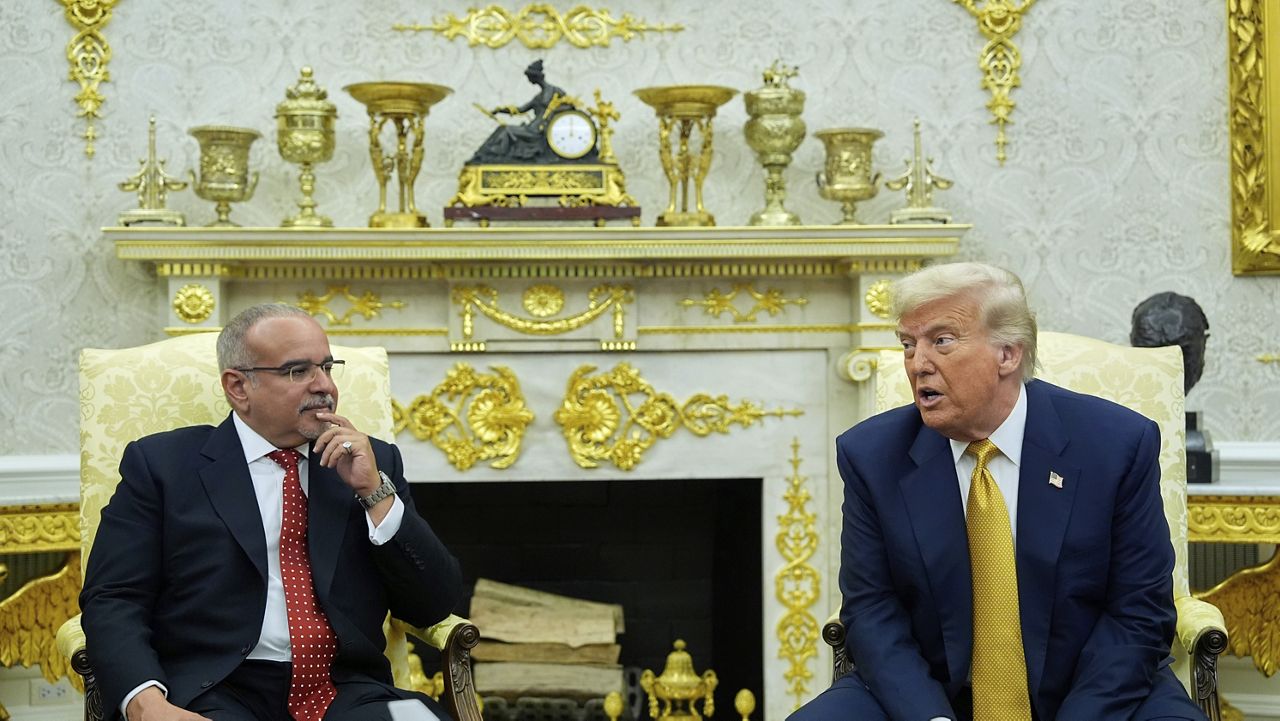WASHINGTON — President Donald Trump hosted the head of Bahrain’s government at the White House on Wednesday, weeks after the U.S. carried out strikes in Iran and as his administration continues its efforts to facilitate a ceasefire in Gaza.
Sitting down in the Oval Office, Trump praised Bahrain Crown Prince Salman bin Hamad Al Khalifa and his island nation in the Persian Gulf as a “fantastic ally” to the U.S.
The crown prince reciprocated the pleasantries and announced $17 billion worth of investments in the U.S., a move Trump noted with appreciation as the latest agreement demonstrating his effort to secure deals for America with affluent countries in the region. Trump mentioned his trip to the Middle East in May — during which he stopped in Saudi Arabia, the United Arab Emirates and Qatar and secured more than $2 trillion worth of investments, according to the White House.
“This is real,” the Bahrain leader said of the investments. “These aren’t fake deals.”
Apart from the new business ties, Bahrain has also been an important security partner to the U.S., even hosting the U.S. Navy’s Fifth Fleet. The country was also one of a handful that took part in the Abraham Accords, which normalized diplomatic relations between Israel and several Arab nations in what marked a major foreign policy victory for Trump in his first term.
Trump noted the pair would also be discussing the U.S. strikes on nuclear facilities in Iran last month that paved the way for a ceasefire between the country and Israel.
The crown prince said he believes the “volatility of the situation” that was roiling the region as Israel and Iran traded strikes has been “reduced.” He added that he initially “didn’t know where it was going to go” on the Sunday after the U.S. got involved militarily.
The Bahrain leader said Iran is “the ones that stand to benefit” from returning to the negotiating table with the U.S. over its nuclear program. Trump jumped in to add that Tehran does “want to negotiate badly” — a statement he has made since shortly after the U.S. strikes – but stressed his administration is “no rush.”
The meeting also comes as the Trump administration is in the thick of trying to secure a ceasefire and hostage release deal between Israel and Hamas after the president and other U.S. officials expressed confidence last week that an agreement was on the horizon. Trump’s special envoy Steve Witkoff said at a Cabinet meeting last Tuesday that the administration was “hopeful” there would be a 60-day ceasefire that included the release of 10 live hostages and nine bodies of deceased captives by the end of the week, although such a situation did not play out.
Trump is also expected to have dinner with the prime minister of Qatar — a Gulf nation that has been essential in negotiations between Israel and Hamas — in Washington on Wednesday.
Prior to Trump’s meeting, Secretary of State Marco Rubio was joined by Bahraini Foreign Minister Abdullatif bin Rashid Al Zayani to sign a memorandum of understanding boosting cooperation between the two nations on civil nuclear energy projects.
Meanwhile, Trump also noted he would be discussing trade with his Bahraini counterpart during their meeting, which comes as the president has been rolling out letters to specific countries to let them know the new tariff rate he intends to charge them to do business with the U.S. if they don’t secure a deal with his administration by his fresh Aug. 1 deadline. The tariffs, Trump argues, are a result of other countries treating the U.S. unfairly in trade for years.
Trump noted during the meeting on Wednesday that he planned to send more than 150 “smaller” countries, which the U.S. does not do a lot of business with, a letter informing them of their new tariff rate, which he said would be the “same for everyone” in that group. Trump estimated Tuesday that the rate could be “a little over 10%” for countries in that group.
He also said that tariff rate of 25% that he recently set for Japan — major U.S. ally — in his letter to the country would likely stick, even though the two countries are still in talks.
“We’re negotiating with them but I think probably we’ll live by the letter with Japan,” he said.
Trump also said he was “very close” to a deal with India, something the president and those in his administration have said for weeks.
The U.S. runs a trade surplus with Bahrain, amounting to $441.9 million last year, according to the Office of the United States Trades Representative.
